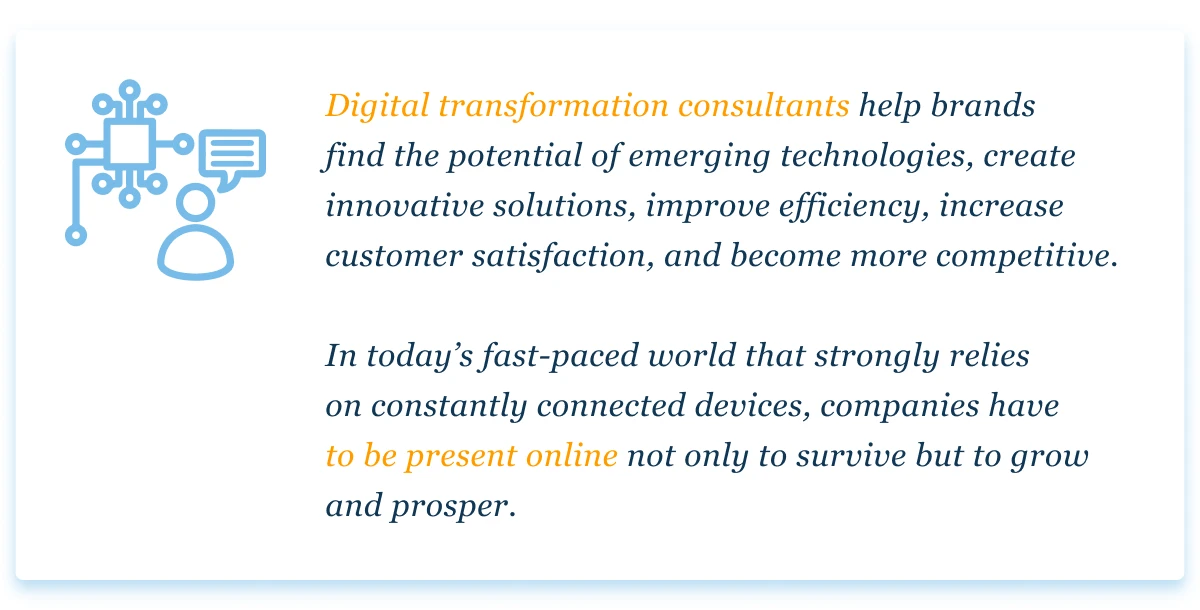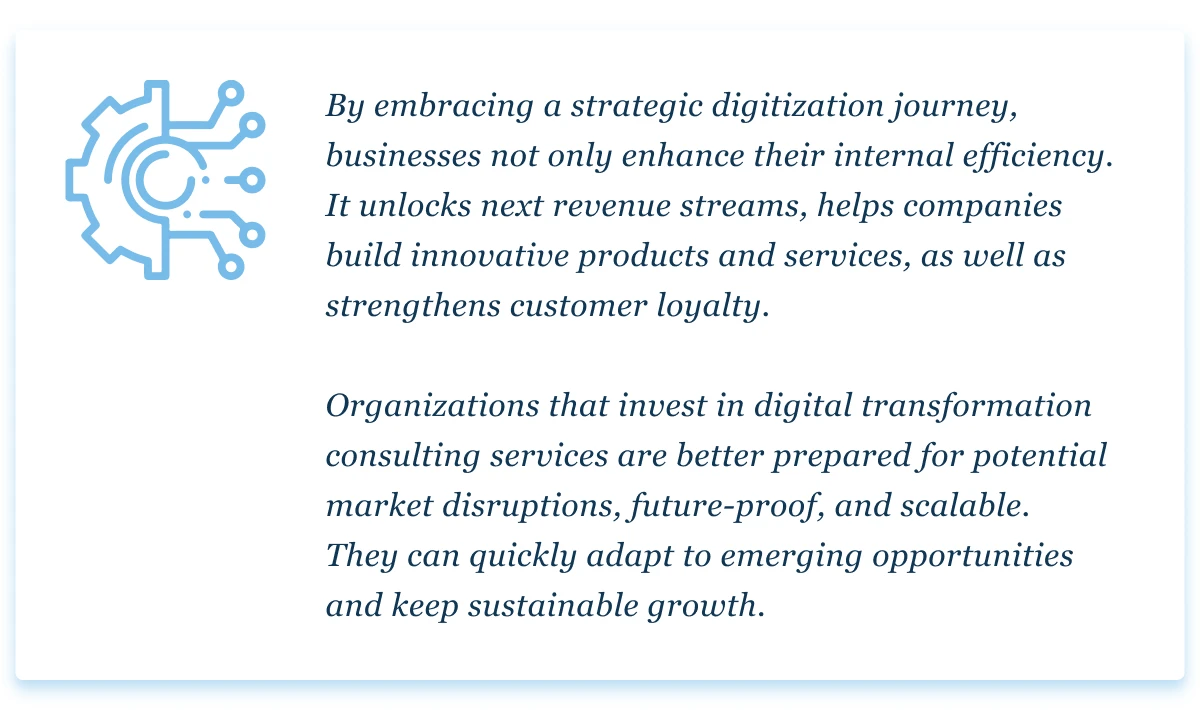Digitization of business offers numerous opportunities and is a significant chance for companies to reach their potential. That’s why many brands are searching for digital transformation consulting. They need a reliable partner who will navigate them through this shift and help them level up every aspect of their organization.
How to adopt new technologies, strategize online presence, and take advantage of the benefits? That’s what we answer in this comprehensive guide. We take a closer look at the potential of digitization. Moreover, we showcase how digital transformation consulting services can have a positive impact on this process by optimizing and adjusting it to individual business needs.
Understanding digital transformation
Digital transformation (DX) is a complex organizational revolution that integrates digital technologies in all types of business operations. It leads to altering how the company works and delivers value to its customers. However, introducing a technological improvement is not what can be called DX. The whole process has to be strategized to truly reinvent the company’s internal culture, work environment, and customer experiences.

Digital transformation consulting market
Research by IDC shows that companies around the globe will invest $3.4 trillion in digital transformation by 2026. Polaris Market Research predicts that the digital transformation market size will be constantly growing, reaching a CAGR of 23.6% until 2030. The statistics prove that companies are proactively searching for help to approach these processes the right way and grow ROI.
77% of worldwide businesses already kickstarted the process of digitization. Many did that during the pandemic when being online was necessary to keep up. However, their efforts could be chaotic and not strategized, resulting in poor delivery. It’s important to plan and execute such enormous steps with the right mindset, know-how, and attention to detail. Digital transformation services and consulting are the best ways to either begin the process or improve the existing strategy.
Key elements of digital transformation
As we’ve mentioned, digitization is not the implementation of one online tool. It’s an elaborate process that includes the following:
- Technology adoption and integration: Companies introduce a full spectrum of cutting-edge technologies such as AI, cloud computing, Internet of Things (IoT), as well as a wide range of solutions dedicated to data analytics and performance enhancement. They all serve as a foundation of digital transformation.
- Process optimization and automation: The next step is rethinking and redesigning existing operations to eliminate inefficiencies and enhance productivity. Automation streamlines routine tasks, freeing up resources for more strategic and creative endeavors.
- Data-driven decision-making: Data collection and analytics is the crucial game-changer in digital transformation. They can be leveraged to make informed decisions based on facts and not assumptions. Advanced business intelligence plays an essential role in finding actionable insights from various information sources.
- Customer-centric focus: Thanks to digital initiatives, companies can place the customer at the center of their strategies. Being online means they can perform customer care analytics to understand their needs, preferences, and behaviors better. This leads to tailoring products and services to meet specific demands. Personalization and seamless customer experience are easier to achieve.
- Cultural and organizational pivot: A successful digital transformation requires a cultural shift within a company. This involves fostering an innovative mindset among employees and promoting continuous learning. Brands should also invest in upskilling and training for their teams to ensure they have the necessary competencies.
- Strategic vision and alignment: There’s no transformation without a well-defined strategy. Digitization should be in tune with the organization’s general business objectives to make sure that the change contributes to long-term success.
- Ecosystem collaboration and partnerships: Taking steps towards digital transformation often means finding external partners, suppliers, and contractors that can deliver and handle infrastructure and other connected matters. Businesses should take advantage of the expertise other stakeholders have to offer and create mutually beneficial opportunities.
Digital transformation in business
In the era of hyper-connectivity, businesses that resist digital transformation risk becoming irrelevant. Rapid technological advancements caused changes in consumer expectations and behaviors. Adopting a digital-first approach allows companies to put their customers first and stay competitive. Moreover, the COVID-19 pandemic proved that digitization is imperative in times of crisis and increased the significance of digital capabilities in enabling remote work, online services, and resilient business operations.

What is digital transformation consulting?
Digital transformation consulting companies specialize in assisting businesses in building and executing digitization strategies to boost their customer experiences, operations, and competitiveness. They support their clients in leveraging technology and integrating it with their existing work environments. They analyze the current state of the company, develop a tailored plan, provide valuable market insights, and offer implementation guidance to help organizations understand what digital initiatives can do for them.

Source: Unsplash
What do digital transformation consultants do?
Providers that offer consulting in digital transformation hire experienced professionals who bring expertise and know-how to the table. They guide businesses that go through digital evolution. Their responsibilities usually include:
- Conducting in-depth assessments of the current state to identify areas for improvement.
- Developing customized digitization strategies aligned with the company’s goals.
- Considering factors such as organizational capabilities, up-to-date industry trends, and competitors when planning the steps to take.
- Providing recommendations on tech adoption and integration, ensuring that selected solutions harmonize with the proposed strategy.
- Overseeing implementation and managing changes introduced to the organization, coordinating with internal teams and external vendors.
- Training employees, delivering educational materials, and supporting the company in seamless adoption.
- Measuring and analyzing the impact of digital initiatives to ensure the effectiveness of the transformation journey.
5 stages of digital transformation – case study
Here’s an example of how a company that already has a minimal digital presence but wants to take their business to the next level can go through digitization.
Business as usual
At this moment, the organization is somewhat present online. They might have a social media profile or two and use technology for basic operations. Everything is done manually – content posting, data entry, and customer service. Employees and managers might report limitations in their daily work. The brand’s goals include expansion and resource optimization.
Experimentation
The decision-makers start to consider going further. They look for digital transformation consulting services and solutions to begin the process in isolated business areas. This phase involves pilot initiatives and proof-of-concept projects to test the possibilities, measure results, and adjust the novelty concepts accordingly.

Source: Unsplash
Strategic adoption
It’s time to integrate digital technologies into core business functions. This stage should be highly strategized to ensure maximum efficiency. At this point, the stakeholders will be able to notice the first significant shift in the way the company approaches its business.
Transformation
Digitization becomes an integral part of the brand’s business model, enabling it to introduce innovative ideas and propose new selling points. At this point, brands don’t integrate technology, but actively use it to build new products and services, find new revenue streams, enhance performance, lower costs, and automate certain tasks.
Fully digitized
Thanks to the help of digital transformation consultants and hard work on the organization’s side, the brand has become entirely digital. It seamlessly integrates technologies across all business areas. Processes are automated and decision-making is data-driven. Employees and other stakeholders can use implemented tools to communicate, handle their duties, and improve their results.
How to pick the right digital transformation consulting services and solutions?
Since digital transformation is an important quest, selecting the right consulting partner can determine future success. What are the key considerations to remember when choosing such a vendor?
- Expertise and experience: Consulting firms for digital transformation should have a proven track record of helping their clients in that area. Their experience, knowledge, and understanding of unique business needs mean they can prepare tailored solutions.
- Comprehensive skill set: Digital transformation requires a multidisciplinary skill set. That’s why it’s crucial to find a partner that specializes in strategic planning, technology implementation, change management, and data analytics.
- Client references and case studies: Digital transformation consulting companies that share their portfolios and have reviews from satisfied previous clients are more trustworthy. They prove that the vendor can deliver expected results and help their clients achieve success.
- Clear methodology: Asking about the consultant’s approach and work methods should be an essential part of initial contact. Their process should be structured and incorporate monitoring to ensure constant improvements. This ensures a systematic and organized approach to the transformation journey.
- Customized solutions: One-size-fits-all solutions are not the best choice for comprehensive digital transformation. A reputable consulting company should be able to tailor their recommendations and actions to align with individual business objectives and industry dynamics. Also, their solutions should be adaptable and scalable.
- Strong communication skills: Without effective communication, collaboration is destined to fail. Consultants should be able to explain complex concepts in a clear and understandable manner. They should also listen to their clients, so they can understand the organization’s challenges and goals.
- Collaborative approach: The consulting firm has to work closely with internal teams, managers, and other stakeholders to determine how digitization can complement the existing processes and fix areas that require improvements. Collaborative effort is necessary to transfer knowledge, build long-term sustainability, and achieve success.
- Adaptability and innovation: The digital landscape is dynamic, which means that solutions can become outdated or not efficient enough for a rapidly growing business. Consulting digital transformation means that the client also gains a flexible adaptability strategy prepared for future challenges and emerging market trends.
- Transparency: Being honest about required resources, project costs, and other technicalities is what makes a partner stand out from the competition. These matters should be discussed regularly, especially if the project scope evolves and additional resources are required.
AI’s role in digital transformation for 2024 and beyond
While digital transformation harnesses a broad spectrum of technologies and their capabilities, artificial intelligence (AI) is now considered the main force that will accelerate change within the industry. That’s because algorithms offer enormous potential in terms of content generation, task automation, achieving hyper-personalization, and data architecture. It can be used to reduce human labor in areas like customer service, marketing and sales, technical problem-solving, and designing highly customized products while leaving space for employees to focus on creative duties or sensitive customer cases.
AI, for example in the form of GPT integration solutions, is an ally for companies that want to run business with awareness, making decisions based on facts and numbers instead of intuition. Digital transformation consultants able to help their clients level up with the help of AI and other technologies will become leaders within their field. On the other hand, companies that will embrace AI with courage will be rewarded because this innovation can truly revolutionize the way they do business.
Other key trends in digital transformation
As of 2023, several technology trends are shaping the landscape of digital transformation:
Cloud computing
Digital transformation requires a robust infrastructure and the cloud is flexible, scalable, and accessible. It’s a powerful environment for building applications, storing files, and communicating with other stakeholders.
Edge computing
Decentralized computing does accelerate real-time data processing, enabling faster responses and reducing latency. A promising technology for companies that want to boost their operations.
Blockchain
Secure and transparent transactions, as well as document-keeping, are the strong traits of blockchain. It can be used to enhance the reliability and safety of any brand’s operations.
Internet of Things
Many businesses can use devices and sensors to collect and analyze data. They can also offer such products to their customers to give them extraordinary experiences.
Cybersecurity
Securing digital assets is a must for brands that want to operate in the digital realm. Investing in robust cybersecurity systems means that they can protect their customers’ sensitive information and deliver more trustworthy services.
Data privacy
Ensuring compliance with evolving regulations will be essential in the years to come. Consumers want the law to protect their privacy, so companies will have to respect that and implement their strategies according to these principles.
The future of digital business transformation consulting
What can be expected from the digital transformation consulting industry in 2024 and beyond? Here are our predictions:
Focus on customer-centricity
Putting customer needs and experiences at the forefront of digital initiatives will be recommended by all advisors. There’s an urge to create customer-centric strategies because they proved to be highly effective. Also, brands want to be more authentic and build meaningful connections with their audiences. Digital transformation will involve continuous feedback loops, customer journey mapping, and multiple techniques for understanding customer behaviors.
Peak agility and adaptability
Responding to quickly evolving market dynamics will require a flexible, iterative approach to new digital projects. Agile methodologies, cross-functional teams, AI marketing analytics, and rapid prototyping will be major elements in the approach that digital transformation management consulting providers will recommend.

Source: Unsplash
Ethical and sustainable practices
Companies can’t only think about themselves anymore. They need to be aware of environmental issues, sociopolitical challenges, and potential cyber threats. Digital transformation strategy consulting will put emphasis on process optimization that does not only increase performance and reduce costs but also takes ethical aspects into consideration.
Continuous innovation
Digital transformation is an ongoing process, especially in today’s world when innovations are introduced to the world on a regular basis. Brands will be encouraged to introduce them into their structures to keep up with their competitors and meet the demands of modern consumers. Fostering a culture of experimentation will be one of the core principles for businesses that want to expand.
Conclusion
Business consulting and digital transformation come hand in hand to support brands that want to improve their business operations and revenue. Embracing digitization is no longer a choice – it’s a strategic move for companies. Engaging with firms that provide consulting is the best way to get the guidance needed to navigate this complex journey. By understanding the key areas and trends outlined in this article and working with the right partners, businesses can go through digital transformation with confidence and purpose.
Digital transformation of your business
Planning to go digital in 2024? Contact us, and our consultant will reach out to discuss your needs.



